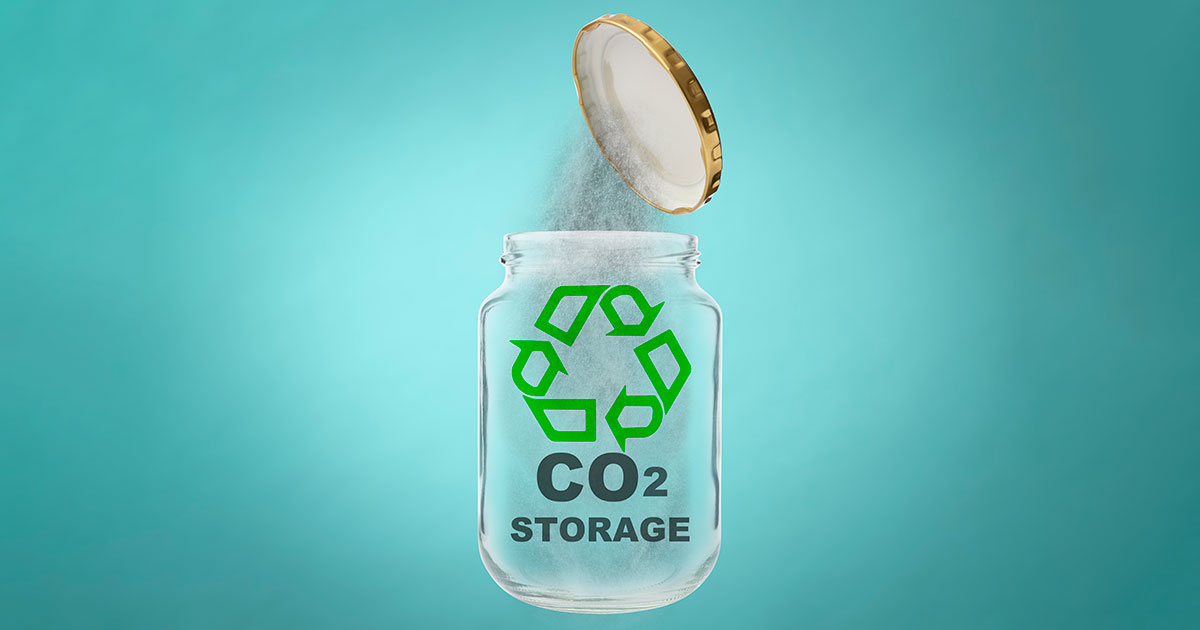
Simply put,
carbon capture is a collection of technologies that capture carbon – as to limit the amount of carbon dioxide in the atmosphere. Carbon can be captured from a
point source of emissions, like a power plant or industrial facility. Or carbon can be captured
directly from the atmosphere.
Once captured, carbon can be
permanently stored underground or transformed into
useful products (aka “carbontech”). For example, captured carbon could be used to create
cement, textiles, carbon fiber, plastics, and more.
Not only are these strategies innovative, but they are also profoundly powerful. In terms of storing carbon underground, the geology of the United States could
store about 3,000 metric gigatons.
But transforming carbon into useful products can also have a massive impact. For example, the consulting firm McKinsey estimates that, by 2030, 3,000 metric megatons of carbon dioxide could be
infused into construction materials alone.
Federal and Private Sector Interest
The
federal government has long invested in carbon capture. For example, since 2008, the federal government has provided a tax credit –
the section 45Q credit – for capturing carbon.
 Andrew Gunem, U.W. Law School Class of 2023, is an incoming summer associate at Godfrey & Kahn, S.C. Previously, he interned for EPA Region 5 (Office of Regional Counsel in Chicago).
Andrew Gunem, U.W. Law School Class of 2023, is an incoming summer associate at Godfrey & Kahn, S.C. Previously, he interned for EPA Region 5 (Office of Regional Counsel in Chicago).
But today, the space is experiencing an unprecedented surge in federal funding. For one, the DOE launched
the Carbon Negative Shot initiative – which aims to “slash the costs and accelerate the deployment” of carbon capture. And with the Infrastructure Investment and Jobs Act (IIJA), Congress
provided billions of dollars in funding for various carbon capture programs.
Carbon capture is also experiencing a flood of private sector funding. Perhaps most notably, the Swiss company
Climeworks raised $100 million from Audi, Stripe, and Microsoft, among others. But closer to home, Carbon America, a Colorado-based company, recently secured
$30 million in Series A funding. Also, the Massachusetts-based
Verdox raised $80 million in VC funding. In the end, by one think-tank’s estimate, the market for carbontech products in the U.S. could eventually
reach $1 trillion.
Opportunities for Wisconsin
Wisconsin can profit from carbon capture innovation in many ways.
Wisconsin already has a track record of success in this sector. In 2021, a student team from UW-Madison won $250,000 – the maximum available prize – from Elon Musk’s XPRIZE competition for carbon capture innovation.
Given the current surge in federal funding and private investment, the time is ripe for more Wisconsin-based innovation and success.
First, Wisconsin could profit from storing carbon underground. For one, “carbon farming” has emerged as
a way for agriculture to combat climate change while potentially creating a
valuable commodity.
Additionally,
parts of Wisconsin may have the necessary geology for storing carbon deep underground. Meanwhile, Wyoming – which has the necessary geology – is
aggressively pursuing carbon capture opportunities. For example, a carbon capture and storage facility in LaBarge, Wyoming, will expand after a pledge of
$400 million in corporate investment.
Second, Wisconsin can profit from transforming carbon into useful products. As noted previously, the variety of use cases for captured carbon is vast. But one carbontech innovation highlights the sector’s broad potential – while dovetailing with Wisconsin’s heritage and economy: breweries that capture carbon.
Breweries that Capture Carbon: A Win-Win-Win
Carbon dioxide
is an essential ingredient for brewing beer. Specifically, it improves “sensory outcomes, beer foam, mouthfeel, and shelf stability.” Thus, brewers are forced to buy carbon dioxide from commercial sources. But the brewing process also
creates carbon dioxide, which is historically just released into the atmosphere. But
there is a better solution. Breweries can capture the carbon that they create, and they can turn right around and recycle that captured carbon – by using it as an ingredient in their beer.
Wisconsin breweries would experience a win-win-win by adopting carbon capture processes.
The first win: breweries would save money – by harvesting their carbon, breweries could stop buying carbon dioxide from a third party. For example, the Texas-based
Hops & Grain invested in a carbon capture system
built by Earthly Labs. After installation, the brewery captures 1.3 times the carbon dioxide they once purchased. The expected
return on investment is just 1-2 years.
The second win: breweries would become more independent and resilient. In recent years,
supply chain issues have reduced the availability of commercial carbon dioxide. These issues have forced breweries to either pay more for carbon dioxide or reduce their production. But by using carbon capture, breweries wouldn’t be susceptible to such supply chain issues. Rather, breweries could harvest their home-grown carbon.
The third win: breweries could increase profits. A
2018 study found that 59% of consumers would happily pay $1.30 more for sustainably produced beer. Thus, breweries that capture carbon could charge a premium. But even if a brewery doesn’t raise its prices, crafting a great beer that also fights climate change could be a powerful selling point and branding opportunity.
Conclusion: A Bright Future
But carbontech in breweries is just one – albeit heady – example. The future is bright for carbon capture in the United States. The stakeholders who capitalize on these opportunities will be handsomely rewarded. Wisconsin should not miss out.
This article was originally published on the State Bar of Wisconsin’s
Environmental Law Section Blog. Visit the State Bar
sections or the
Environmental Law Section webpages to learn more about the benefits of section membership.
